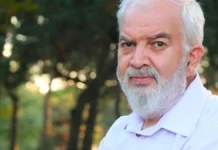Akif Sarı, who was arrested for alleged links to the Gülen movement, has developed severe psychological problems after being kept in a solitary cell for more than a year, Bold Medya reported.
Sarı told his wife Melike Sarı that he was hallucinating and sometimes saw phantom images of himself. Melike Sarı said her husband could not bear to see or speak of their children and broke down when she mentioned them.
“I am afraid he will completely lose his mind,” said Melike Sarı. “I want him to be transferred to a normal ward so his cellmates can support him.”
Akif Sarı had requested to see the prison psychologist a few months ago, but the meeting did not go well. According to Melike Sarı, the psychologist told her husband he did not have the right to complain as he was a criminal.
“The psychologist who was supposed to calm him, instead further agitated him,” said Melike Sarı.
Sarı was arrested in January 2020 for working at an association affiliated with the Gülen movement, a faith-based group inspired by Turkish cleric Fethullah Gülen. Witness testimony and use of the ByLock messaging app were presented as evidence against him.
ByLock is an encrypted messaging app used on smartphones and was available on Apple’s App Store and Google Play. Turkish authorities claim that ByLock was a communication tool exclusively used by members of the Gülen movement to ensure the privacy of their conversations.
Turkish President Recep Tayyip Erdoğan has been targeting followers of the Gülen movement since the corruption investigations of December 17-25, 2013, which implicated then-Prime Minister Erdoğan, his family members, and his inner circle.
Dismissing the investigations as a Gülenist coup and conspiracy against his government, Erdoğan designated the movement as a terrorist organization and began to target its members. He intensified the crackdown on the movement following an abortive putsch on July 15, 2016 that he accused Gülen of masterminding. Gülen and the movement strongly deny involvement in the coup attempt or any terrorist activity.
The UN Human Rights Council’s Working Group on Arbitrary Detention (WGAD) has repeatedly stated that arrest and conviction based on ByLock use in Turkey violated Articles 19, 21 and 22 of the International Covenant on Civil and Political Rights.
In an opinion WGAD noted that “no explanation has been provided [by the Turkish government] as to how the alleged use of this application … could be equated with a criminal act.”
Melike Sarı said she was told by the prison administration that her husband was kept in a solitary cell because he was tried for being in a leadership position of the movement. Denying these claims, Melike Sarı said her husband stood trial and was sentenced to 10 years in prison for membership in the movement.
Peoples’ Democratic Party (HDP) deputy Ömer Faruk Gergerlioğlu called the prison administration to ask about Sari’s condition but was told he was fine. “I was very surprised by this answer, so I asked my husband during a phone call, and he said no one had spoken from the prison administration,” said Melike Sarı.
There have been previous reports of inmates staying in solitary cells who have complained of mental health problems.
Former teacher Muzaffer Özcengiz, who was also arrested for Gülen links, wrote a letter before he died in 2019 saying he had suicidal thoughts. Özcengiz was sentenced to 12 years in prison and had been in a solitary cell for 14 months. He was found dead in his cell a few days after he wrote the letter.
The Deutsche Welle news agency (DW) published a piece on mental health problems in Turkey’s solitary cells and said they had contacted the Ministry of Justice Bureau of Inquiry several times about the number of inmates in these cells and why several inmates in these cells had died. According to DW, the ministry did not respond to their questions.
Speaking to DW, Gergerlioğlu said the number of inmates put in solitary cells had increased in recent years, especially after a state of emergency was declared following the coup attempt. He added that the Ministry of Justice would not comment on the number of inmates so the exact number was unclear.
“What we do know is that inmates in solitary cells are under unprecedented stress,” he said. “Not only are they alone in their cells, they are also not allowed time in the courtyard or to participate in sporting activities.”
Gergerlioğlu said that according to the law an inmate could only stay in solitary confinement for a maximum of 20 days. However, there were currently hundreds of inmates who had been in this situation for more than two years.
Traditionally inmates who have been handed an aggravated life sentence are put in solitary cells; however, an increasing number of political prisoners have been confined in these cells in recent years.
















[…] have been previous reports of inmates staying in one-person cells who have complained of mental health […]
[…] have been previous reports of inmates staying in one-person cells who have complained of mental health […]
[…] have been previous reports of inmates staying in one-person cells who have complained of mental health […]